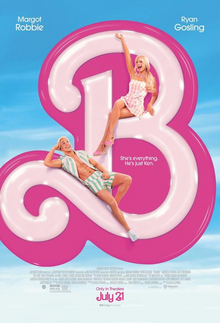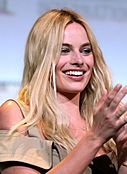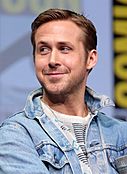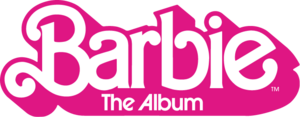Barbie (film) facts for kids
Quick facts for kids Barbie (film) |
|
|---|---|

Theatrical release poster
|
|
| Directed by | Greta Gerwig |
| Produced by |
|
| Written by |
|
| Starring |
|
| Music by |
|
| Cinematography | Rodrigo Prieto |
| Editing by | Nick Houy |
| Studio |
|
| Distributed by | Warner Bros. Pictures |
| Release date(s) | July 9, 2023 (Shrine Auditorium) July 21, 2023 (United States and United Kingdom) |
| Running time | 114 minutes |
| Country |
|
| Language | English |
| Budget | $128–145 million |
| Money made | $1.446 billion |
Barbie is a 2023 fantasy comedy film directed by Greta Gerwig. She wrote the story with Noah Baumbach. The movie is based on the famous fashion dolls made by Mattel. It's the first live-action Barbie film, meaning it uses real actors, unlike the many animated movies before it.
The film stars Margot Robbie as Barbie and Ryan Gosling as Ken. They go on a journey of self-discovery from their perfect home, Barbieland, to the real world. This happens after Barbie starts to have confusing thoughts about life. The movie also talks about how society works, including ideas like patriarchy (where men hold most of the power) and feminism (the idea that women should have equal rights).
Many other actors are in the film, like America Ferrera, Michael Cera, Kate McKinnon, Issa Rae, Rhea Perlman, and Will Ferrell.
The idea for a live-action Barbie movie started way back in 2009. Over the years, different studios and actors were involved. Sony Pictures first had the rights, and actresses like Amy Schumer and Anne Hathaway were considered for Barbie. Eventually, Warner Bros. Pictures took over in 2018. Margot Robbie was cast as Barbie in 2019. Greta Gerwig joined as director and co-writer in 2020. The rest of the cast was announced in early 2022. The main filming took place in England and Los Angeles from March to July 2022.
Barbie first showed in Los Angeles on July 9, 2023. It was released in cinemas in the United States on July 21. It came out at the same time as another big movie, Oppenheimer. This led to a fun trend called "Barbenheimer", where many people watched both films one after the other. The movie has earned over $1.4 billion worldwide. It became the highest-grossing film of 2023 and one of the highest-grossing films ever. Barbie also won several awards, including an Academy Award for Best Original Song ("What Was I Made For?"). It also won two Golden Globe Awards.
Contents
Story of Barbie
Stereotypical Barbie, played by Margot Robbie, lives in Barbieland with many other Barbies. Barbieland is a place where women are confident, independent, and successful. They hold all the important jobs, like doctors, lawyers, and politicians. The Kens, on the other hand, spend their days having fun at the beach. Beach Ken, played by Ryan Gosling, is only truly happy when he is with Barbie. He wants to be closer to her, but Barbie prefers her independence and friendships with other Barbies.
One day, during a big dance party, Barbie suddenly starts thinking about serious things, like life and death. The next day, she finds she can't do her usual perfect routine. Her feet are flat, and she has cellulite (small dimples on the skin). Weird Barbie, who is a wise outcast, tells her that to fix this, she must go to the real world. She needs to find the child who is playing with her. On her way, Barbie discovers that Ken has secretly joined her in her car. She reluctantly lets him come along.
When they arrive at Venice Beach in the real world, Barbie and Ken cause a lot of attention. The CEO of Mattel, the company that makes Barbie, orders them to be caught. Barbie finds her owner, a teenage girl named Sasha. Sasha tells Barbie that she encourages unrealistic beauty standards. Barbie feels sad. She then learns that Gloria, Sasha's mother and a Mattel employee, is the reason for her confusing thoughts. Gloria had been playing with Sasha's old Barbie toys because she was having her own identity crisis (a time of confusion about who you are). She accidentally passed her feelings onto Barbie.
Mattel tries to put Barbie back in a toy box to fix her. But Barbie escapes with help from Gloria and Sasha. The three of them travel back to Barbieland, with the Mattel CEO and other important people chasing them.
Meanwhile, Ken learns about the patriarchal system in the real world, where men are in charge. For the first time, he feels respected and important. When he returns to Barbieland, he convinces the other Kens to take over. The Barbies are then taught to act submissive, like maids or housewives. Barbie arrives and tries to get Ken and the Barbies to go back to how things were, but they refuse. She becomes sad. However, Gloria gives an inspiring speech about how society expects too much from women. This helps Barbie regain her confidence.
With help from Sasha, Weird Barbie, Allan, and other forgotten dolls, Gloria helps the Barbies remember who they are. The Barbies then trick the Kens into fighting among themselves. This distracts them from changing the Barbieland rules to make men superior. The Barbies regain their power. In the process, they also realize that their old society wasn't perfect. They decide to make Barbieland better for everyone, including the Kens and all the outcast dolls.
Barbie and Ken apologize to each other. Ken feels lost without Barbie, so Barbie encourages him to find his own identity. Barbie is still unsure of her own purpose. She meets the spirit of Ruth Handler, who helped create Mattel. Ruth explains that Barbie's story doesn't have a set ending. Her history keeps changing and growing.
After saying goodbye to everyone, Barbie decides to become human and live in the real world. Later, Gloria, her husband, and Sasha take Barbie, who is now called "Barbara Handler," to her first doctor's appointment. This is a gynecological appointment, which is a check-up for women's health.
Characters in the Movie
Here are some of the main characters and the actors who play them:
- Margot Robbie as Barbie, often called "Stereotypical Barbie"
- Different versions of Barbie played by:
- Kate McKinnon as Weird Barbie
- Issa Rae as President Barbie
- Alexandra Shipp as Writer Barbie
- Emma Mackey as Physicist Barbie
- Hari Nef as Dr. Barbie
- Sharon Rooney as Lawyer Barbie
- Ana Cruz Kayne as Judge Barbie
- Ritu Arya as Journalist Barbie
- Dua Lipa as the Mermaid Barbies
- Nicola Coughlan as Diplomat Barbie
- Ryan Gosling as Ken, often called "Beach Ken"
- Different versions of Ken played by:
- Simu Liu as Tourist Ken
- Kingsley Ben-Adir as Basketball Ken
- Scott Evans as Stereotypical Ken
- Ncuti Gatwa as Artist Ken
- John Cena as Kenmaid, a merman Ken
- America Ferrera as Gloria, a Mattel employee who helps Barbie in the real world
- Michael Cera as Allan
- Ariana Greenblatt as Sasha, Gloria's daughter
- Rhea Perlman as the spirit of Ruth Handler, who helped create Mattel
- Helen Mirren as the narrator
- Will Ferrell as the CEO of Mattel
- Emerald Fennell as Midge
- Erica Ford as Skipper
Making the Movie
How the Movie Started
The idea for a Barbie movie began in 2009. At first, Universal Pictures was involved, but nothing happened. In 2014, Mattel teamed up with Sony Pictures. They planned to start filming by the end of that year. Over time, different writers worked on the script.
In 2016, actress Amy Schumer was going to play Barbie. She even helped rewrite the script. But in 2017, she left the project because of other work and creative differences. Later, Anne Hathaway was considered for the role.
In 2018, the rights to the movie went to Warner Bros. Pictures. Margot Robbie then started talking about playing Barbie. The Mattel CEO, Ynon Kreiz, really wanted Robbie for the role. He felt she looked like a classic Barbie doll and liked her ideas for the film. Robbie also became a producer for the movie. She told Warner Bros. that the film would be a huge success.
Robbie then asked Greta Gerwig to write the script because she loved Gerwig's other films. Gerwig agreed, but only if her partner, Noah Baumbach, also helped write it. In 2021, Gerwig also agreed to direct the movie. Robbie said they wanted the film to surprise people and give them something they didn't know they wanted.
Writing the Story
Greta Gerwig and Noah Baumbach had complete freedom to write the Barbie movie. They worked on it during the pandemic lockdowns of 2020–2021. Gerwig was inspired by a book called Reviving Ophelia, which is about how society affects teenage girls. She also looked at old, colorful musicals like The Red Shoes. She wanted the sets to look "authentically artificial," meaning they would look fake but still be real objects you could touch.
The script even made fun of Mattel, which made some Mattel officials unsure at first. But the CEO, Ynon Kreiz, trusted Gerwig's vision. He felt that being too safe wouldn't work for a bold character like Barbie. Will Ferrell's character, the Mattel CEO in the movie, was meant to represent big companies. Gerwig and Robbie believed the film was "most certainly a feminist film," even though Mattel officials didn't like that description. They promised to explore the good and bad parts of Barbie while still respecting the doll.
Gerwig was also influenced by her own childhood with Barbie dolls. She wanted the film to celebrate the positive side of Barbie while also showing the unrealistic beauty standards sometimes linked to her. She found it interesting that humans create dolls, and then dolls imitate humans. The movie also has mixed messages, like criticizing shopping but also making plastic products look glamorous. Gerwig wanted the film to help women feel good about themselves and understand that perfection isn't possible.
Gerwig described the film as wild and focused on human feelings. She felt the movie came from the loneliness of the pandemic. The line where Barbie asks, "Do you guys ever think about dying?" shows the film's wild side. She also thought it was cool that "all of these women are Barbie and Barbie is all of these women." She saw the story as a girl's journey from childhood to being a teenager.
She started by imagining Barbie living in a perfect world. Then Barbie would face reality and all the things she was protected from in Barbieland. Gerwig also compared the story to Adam and Eve and was inspired by Paradise Lost, which suggests that there is "no poetry without pain." To show the sad parts of Barbie and Ken facing the real world, she focused on differences. For example, she kept a scene where Barbie tells an older woman she's beautiful, even when asked to remove it. She felt this scene was the "heart of the movie." She also wanted to show that not everyone likes Barbie. There's a scene where Barbie is stared at uncomfortably at Venice Beach. Gerwig included this because she felt it was a common experience, especially for actors. The very end of the film has Barbie saying, "I'm here to see my gynecologist." Gerwig included this line to help young girls feel more confident about their bodies.
Barbie also looks at the problems with power structures. Gerwig said that if "Barbies rule and Kens are an underclass," it's like Planet of the Apes. Ken has low self-esteem and wants Barbie's approval, which Gerwig thought was a good starting point for a story. Ryan Gosling said Gerwig's idea was like a famous logo, creating characters to understand today's world. Ken has the only big emotional song in the film. Gerwig felt this was the moment the movie went beyond what a Barbie film usually is.
Choosing the Actors
When choosing actors, Gerwig and Robbie looked for people with "Barbie energy." This meant a special mix of beauty and excitement.
In October 2021, Ryan Gosling was chosen to play Ken. America Ferrera, Simu Liu, and Kate McKinnon joined the cast in February 2022. Liu said he auditioned because his agent thought the script was one of the best they had ever read. More actors joined in March and April 2022, including Ariana Greenblatt, Alexandra Shipp, Emma Mackey, Will Ferrell, Issa Rae, Michael Cera, and John Cena. Helen Mirren narrated the film's trailers and the movie itself.
Margot Robbie wanted Gal Gadot to play a Barbie, but Gadot was busy. Gerwig also wanted her frequent co-stars Timothée Chalamet and Saoirse Ronan to appear briefly, but they were not available.
Designing the Sets
Sarah Greenwood and Katie Spencer were in charge of the sets. For the Barbie Dreamhouse, they were inspired by mid-century modern homes in Palm Springs. Gerwig wanted to show the fun of the Dreamhouses. She also used ideas from other films and paintings. Everything had to feel real to touch, because toys are meant to be touched. They used real props and painted backdrops instead of too much computer-generated imagery (CGI).
The set design is famous for using a lot of a specific pink paint, Pantone 219. The film used up almost all the world's supply of this pink paint! Gerwig also talked with the cinematographer and costume designer a year before filming to prepare. She even called director Peter Weir for ideas on how to make Barbieland feel like a special, indoor world.
Creating the Costumes
Costume designer Jacqueline Durran worked with Gerwig before. She made Barbie's clothes based on where Barbie was going and what she was doing. The costumes for Barbieland used about fifteen color combinations. They were inspired by French beaches in the early 1960s and actress Brigitte Bardot. For Ken's outfits, Durran focused on colorful sportswear from the 1980s. Ryan Gosling even suggested Ken-branded underwear for his character.
Durran copied outfits from old Barbie dolls, like the "Western Stampin'" dolls from 1993. She saw Barbie dolls as a way to explore different ideas of what it means to be feminine. Most of the clothes were made by Durran's team, but some pieces came from the fashion house Chanel.
Filming the Movie
Filming started on March 22, 2022, in England and finished on July 21, 2022. One famous filming spot was the Venice Beach Skatepark in Los Angeles. Rodrigo Prieto was the cinematographer. Before filming, Gerwig held a sleepover for the female cast members. She wanted them to build good relationships.
She also used old filming techniques from the 1950s, since Barbie became popular in 1959. This helped create a classic look. She also watched an old movie called A Matter of Life and Death to learn about older visual effects. To show the sad feelings of Barbie and Ken in the real world, she told Margot Robbie and Ryan Gosling to act as if they were in a drama. Some extra filming took place in Los Angeles in April 2023.
Movie Music
At first, another composer was set to score Barbie. But by May 2023, Mark Ronson and Andrew Wyatt took over.
Besides the background music, Ronson also put together a soundtrack album. He and Gerwig showed scenes from the movie to artists they wanted on the soundtrack. The album, called Barbie: The Album, came out on July 21, 2023. It features songs by many popular artists like Dua Lipa, Billie Eilish, Nicki Minaj, Ice Spice, and Ryan Gosling himself.
The first song released from the album was "Dance the Night" by Dua Lipa on May 26, 2023. Other songs followed, including "Watati" by Karol G and "Barbie World" by Nicki Minaj and Ice Spice. Ryan Gosling's song, "I'm Just Ken", was previewed on July 10, 2023. The album's fourth single, "What Was I Made For?" by Billie Eilish, came out on July 13, 2023.
Many fans expected the 1997 song "Barbie Girl" by the band Aqua to be in the movie. However, it was not used directly. Instead, "Barbie World" by Nicki Minaj and Ice Spice used parts of the original song. Aqua is credited for their contribution to this new version.
The film also features songs like "Closer to Fine" by the Indigo Girls and "Push" by Matchbox Twenty. Ken starts to love "Push" after visiting the real world. It becomes a funny song about male dominance in Barbieland. Director Greta Gerwig said she loves Matchbox Twenty and only puts songs she likes in her movies.
When the Movie Came Out
In Cinemas
Barbie had its first showing in Los Angeles on July 9, 2023. The European premiere was in London on July 12, 2023. It was released in cinemas in the United States and the United Kingdom on July 21, 2023.
The movie came out on the same day as Oppenheimer, a serious film about a scientist. Because the two movies were so different, many people on social media made funny pictures and posts about them. This trend was called "Barbenheimer." It encouraged audiences to watch both films as a double feature. Cillian Murphy, who starred in Oppenheimer, even suggested people see both movies on the same day.
In August 2023, it was announced that Barbie would be re-released in IMAX cinemas for one week in September. This IMAX version included a new scene after the credits. The IMAX edition starts with an introduction by Greta Gerwig, who talks about the benefits of the IMAX format. The post-credits scene shows Margot Robbie's Barbie and includes funny outtakes.
At Home
Barbie was available for digital download starting September 12, 2023. It was released on Ultra HD Blu-ray, Blu-ray, and DVD on October 17, 2023. The film became available for streaming only on Max on December 15, 2023. This included a version with American Sign Language.
See also
 In Spanish: Barbie (película) para niños
In Spanish: Barbie (película) para niños
 | Delilah Pierce |
 | Gordon Parks |
 | Augusta Savage |
 | Charles Ethan Porter |




